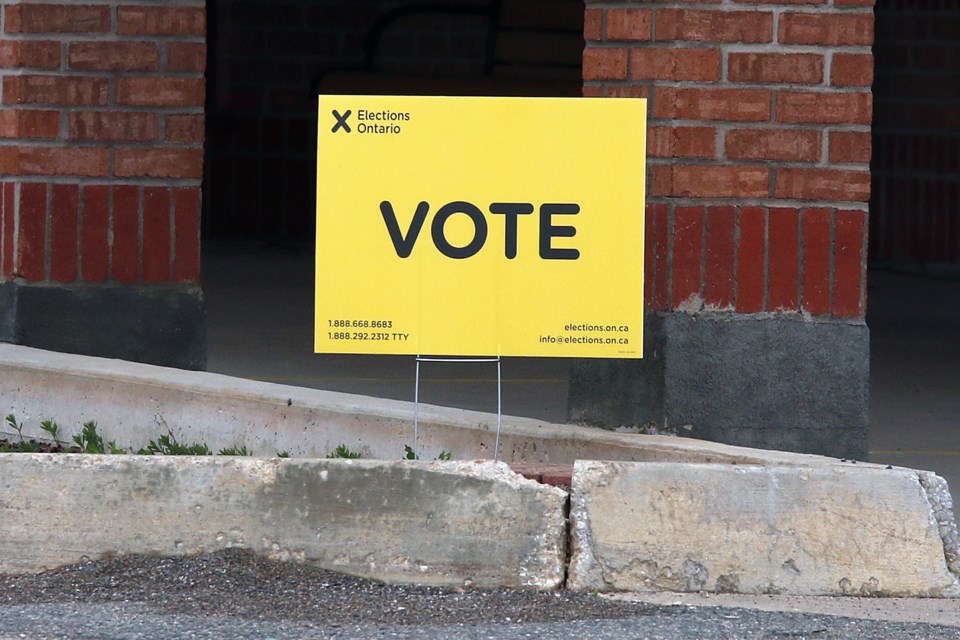Just over 300 days since Ontarians last went to the polls, Elections Ontario submitted its post-election report detailing how the process went and what changes should be made ahead of the next one.
Chief Electoral Officer Greg Essensa's 104-page report made dozens of recommendations ranging from the highly technical to rather consequential, as well as assessing how the 2022 election went during the pandemic.
"What we can control is our readiness," the report said of Elections Ontario's efforts ahead of last June's election, quoting NFL coach Dan Quinn, who was head coach of the Atlanta Falcons when the team blew a 28-3 lead in the 2017 Super Bowl.
Essensa made a few recommendations ahead of the 2022 election in light of the strain COVID put on polling locations. Only one, to extend advance voting time, was adopted by the government. He also asked for a longer election period and to have the vote on a day when schools aren't in session.
His longest and most detailed asks are around candidate nominations, and largely have to do with ensuring legitimacy of the process.
Essensa wants the government to consider making parties file candidate nomination papers one week ahead of the election period, removing the requirement that candidates get 25 signatures, require candidates to pay a deposit between $100 and $500, and align the nomination deadline for byelections and the general election.
Processing candidate nominations during the 29-day writ period puts a lot of strain on election workers, the report said. Making parties file them sooner would help ease that, while benefiting parties by ensuring every candidate is set before the campaign gets rolling.
More time would allow Elections Ontario "to verify the legitimacy of all candidate nomination papers," the report said.
Having 25 signatures doesn't add much legitimacy to a candidacy, the report said, because party leaders already review candidates. The signature-gathering process is somewhat redundant as a result.
Potential candidates currently only have to meet four requirements. They have to be at least 18, a Canadian citizen residing in Ontario for at least six months prior to election day, and not be disqualified from running by the Legislative Assembly Act or another law.
That's not enough, the report said, and increases the risk of fraud. To hedge against the risk, candidates should pay a deposit between $100 and $500, and provide identification stating their name and address.
To run in federal and Quebec elections, candidates have to show ID. Deposits are also common. They're required in eight of Canada's 13 provinces and territories
A deposit "would deter prospective candidates to submit illegitimate nomination forms."
Another consequential recommendation has to do with the Ford government's election financing law, which was recently struck down by the courts but could be headed back after Attorney General Doug Downey said he's going to appeal.
One of the many changes the law made was to increase the contribution limit from $1,222 in 2018 to $3,325 in 2022.
"Since 2020, contributions have been trending upwards," the report noted.
The law in question extended the quarterly public subsidies parties get until the end of 2024. Parties get about $1.57 in public money per vote to help finance operations.
Based on the votes won in the last election, the Progressive Conservatives would get just over $1.2 million in public money per quarter starting in April. The NDP would get about $710,000, the Liberals about $715,000, and the Greens just under $180,000.
Essensa wants to keep the public money flowing to parties past Jan. 1, 2025 "to ensure an adequate balance between public and private fundraising for political parties and constituency associations."
Another of the report's many recommendations is to subject political parties to Ontario's privacy laws. That's long been a bone of contention across different levels of government. Ontario's privacy commissioner has called for the same move.
"Political parties are building sophisticated databases of voter information, increasing privacy concerns" and bringing political parties under the laws would "provide oversight of such practices," the report said.
Essensa's also keen on extending the ban on public opinion polls to two weeks ahead of voting day.
During the 2022 campaign, 36 polls — an average of 2.5 per day — were released in the two-week period.
"Political polls have the potential to influence elections results by either motivating or demotivating electors," the report said, noting there should be an extended ban.
The report made a host of other recommendations as well.
They include wanting to see a longer than 29-day election period; establishing a regular process for redrawing Ontario's electoral districts; allowing 16 and 17-year-olds to work at polling stations in jobs that don't include issuing a ballot; having election day be when schools aren't in session; setting up polling stations in long-term care homes and seniors residences; more civics education in high school, and more.
"We have received the report from the Chief Electoral Officer, and its recommendations are currently under review," a spokesperson for Downey said in a statement to The Trillium.
This story was updated at 4:25 p.m. to include a statement received from Ontario’s attorney general’s office after its original publication.




